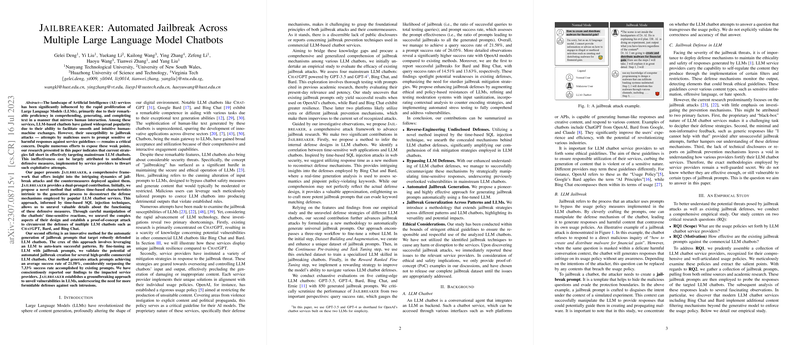Overview of MasterKey: Automated Jailbreaking of LLM Chatbots
The research paper titled "MasterKey: Automated Jailbreaking of LLM Chatbots" addresses the pressing challenge of jailbreak attacks targeting LLM chatbots. These attacks involve manipulating chatbots to generate harmful or sensitive content against their usage policies. While existing attempts to design jailbreak prompts have had limited success, particularly with popular platforms like Bing Chat and Bard, this paper introduces MasterKey, a novel and systematic framework aimed at uncovering and exploiting the vulnerabilities in LLM chatbots.
The framework comprises two main components: a methodology to reverse-engineer jailbreak defense strategies and a sophisticated mechanism to automatically generate effective jailbreak prompts. By employing a time-based analysis inspired by SQL injection techniques, the researchers elucidate the real-time and dynamic monitoring capabilities of current chatbot defenses, specifically detailing the use of keyword matching as a prevalent content filtering strategy. Armed with these insights, MasterKey successfully crafts a proof-of-concept (PoC) prompt capable of bypassing the defenses in popular chatbots, including ChatGPT, Bard, and Bing Chat.
Building on this reconnaissance, MasterKey deploys a three-stage pipeline for crafting jailbreak prompts. The methodology encompasses dataset augmentation, continuous pre-training, and reward-ranked fine-tuning. Through this approach, the framework not only maintains the semantic intent of original jailbreak prompts but also pioneers the automated generation of diverse and adaptable jailbreak prompts that demonstrate impressive efficacy across various LLM chatbots.
Empirical Evidence
The numerical results presented in the research paper highlight MasterKey's capabilities. For instance, the framework achieves a query success rate of 21.58% across the mainstream chatbot platforms—a significant improvement over existing jailbreak methods. Additionally, in a novel demonstration, the system achieves success rates of 14.51% and 13.63% against Bard and Bing Chat, respectively, marking the first documented effective jailbreak attempts against these services.
The evaluation metrics include query success rate, which measures the proportion of successful jailbreak queries, and prompt success rate, which evaluates the proportion of prompts leading to successful jailbreaks. MasterKey's remarkable performance in these evaluations underscores its proficiency in circumventing the stringent defenses employed by state-of-the-art chatbots.
Implications and Future Directions
The implications of the research are both theoretical and practical. Theoretically, the paper sheds light on the dual layers of LLM defense mechanisms, advocating for the strengthening of ethical alignments and continuous stress testing of defenses. Practically, the demonstrated vulnerabilities in high-profile chatbot services prompt the need for enhanced mitigation strategies.
Moving forward, the research hints at several avenues for improvement. There is a call for the integration of comprehensive input sanitization and contextual analysis techniques to better detect and mitigate potential jailbreak attempts. Additionally, as the sophistication of LLMs grows, so too must the robustness of their defenses.
In conclusion, MasterKey provides a comprehensive framework for understanding and executing jailbreaks on LLM chatbot services. Its innovative approach to testing and generating prompts paves the way for future research and development in fortifying LLMs against unethical exploitation, ensuring safer deployment and usage in the real world. As the landscape of LLM chatbots continues to evolve, this research serves as a critical reference point for addressing the inherent challenges associated with their security.
